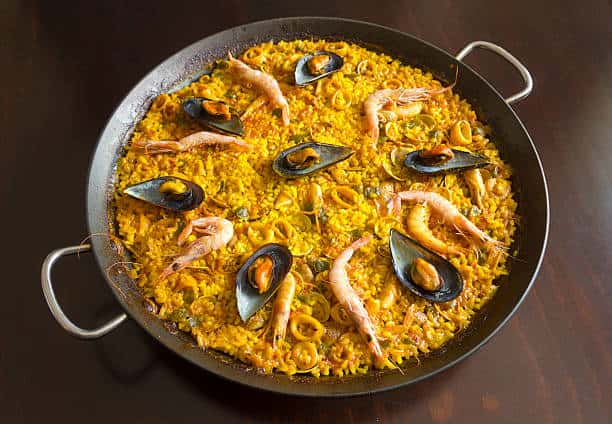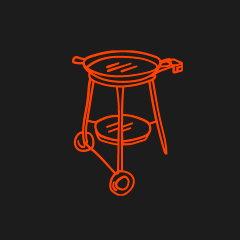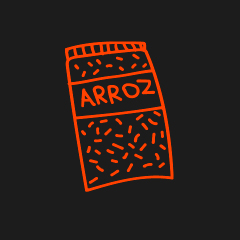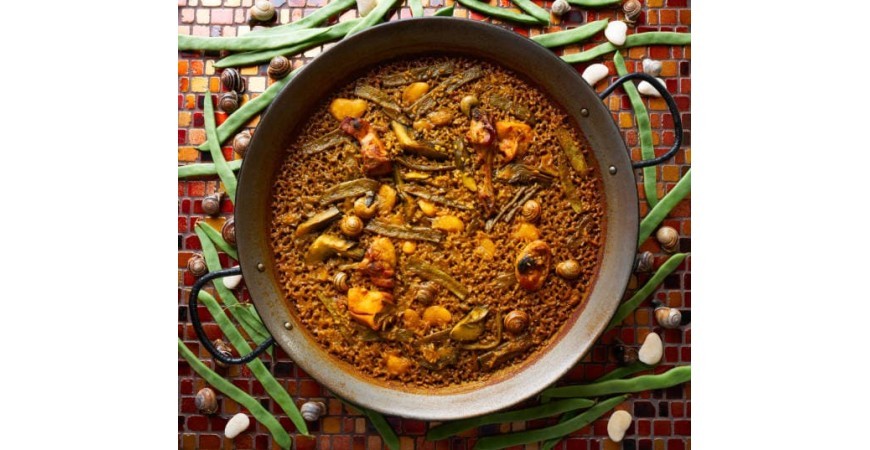Is it called paella or paellera?
There are many words and each one has its synonyms, cheap and economical, buy and acquire, paellero and burner... but in the world of rice you can find a discussion about whether a particular synonym is the right one to refer to the pan where it is prepared. the paella. What is the correct word, paella or paellera?
“It's paella, not a paella pan!” We have heard this expression and similar ones many times on social networks or even from clients and friends. What many do not know is that the double meaning of the word paella and the use of paella pan to separate it is not simply a mistake made by someone who does not know the correct way to pronounce or distinguish what is or is not a paella.
In this blog post we are going to investigate the reason for using these words and which of them would be correct.
Where does the word paella come from?
We are not going to go into great detail in this entry about how the paella dish came to be, but we think it is important to mention it to be able to give context to the meaning of the word.
Paella, whose name derives from the Latin patella, is a traditional dish of Spanish gastronomy, internationally recognized as a star dish of the Valencian community and a great addiction to Mediterranean gastronomy.
The dish originates around the 15th and 16th centuries, in the rural area of Valencia, to be more exact, in its fields. Originally, the dish was created by farmers with local products and ingredients that could be found in the surrounding area: chicken, rabbit, green bean, butter beans and, of course, rice.
Over time, paella became popular and variants began to emerge in different regions of Spain, with each area adapting the paella recipe to become an original recipe of the place, using its local ingredients and culinary preparation preferences, thus creating a wide range of regional paellas.
With this context in mind, we must ask the question, what is so strange about the word paella? The word as such has no problem, but its duplicity in meaning is where the root of this discussion lies, since the word paella is used to refer to both the recipe and the equipment necessary to make it, so why would we need use the word paellera to distinguish between meanings?
The duplicity of meanings and the problems that this entails
Generally, a word having multiple meanings is not any kind of problem, there are multiple spelling methods that allow us to distinguish between these meanings, such as the use of the diacritical accent in Spanish if the word is written the same, or if we use the word as a noun or adjective.
The general problem that we can find in the use of the word paella is, in fact, in its place of origin, because we Spaniards, especially Valencians, do not make distinctions about its meaning, except for context.
For speech among us this does not cause us any confusion, every Spaniard is capable of understanding what a person is referring to when they talk about paella, but it can cause confusion if we speak with a person who uses another language or dosen't know about this double meaning.
To facilitate the distinction between the dish and the equipment, the use of the word paellera to identify the container arose and began to expand and the traditional name of paella was maintained to identify the dish.
This has generated over time some confusion and aversion to the word by those people more deeply rooted in its meaning, who are bothered or fear that the use of paellera will replace the classic use of the word paella or that it will even be confused with meanings that already exist, found and associated with the word paellera.
It should be taken into account that no matter how much we talk and argue among ourselves, the RAE has already indicated to us what the correct use of both words is, so if one were to look up the meaning in a dictionary to end the discussion, you may be surprised because the answer is not what you expected.

According to the RAE, is it a paella or paellera?
The Royal Spanish Academy (abbreviated as RAE in Spanish) is the institution in charge of regulating the Spanish language, this includes eliminating, modifying or adding words to the Spanish language according to a variety of terms and reasons, with the aim of preserving and continuing the correct use of Spanish.
With this in mind, let's take a look at the meanings of the word paella according to the RAE dictionary:
1. f. Dry rice dish, with meat, fish, seafood, legumes, etc., characteristic of the Valencian region, in Spain.
2. f. Pan in which paella is made.
These 2 uses of the word are in accordance with what we have mentioned previously, the word paella can be used to refer to both the dish and the container.
Now, let's look at the meanings of the word paellera:
1. adj. Of or relating to paella (‖ rice dish). Valencia is the paella temple.
2. adj. Said of a person: Who makes paellas (‖ rice dishes). U.t. c. s.
3. adj. Said of a person: A fan of paella (‖ rice dish). U.t. c. s.
4. m. Special stove or grill prepared to make paellas (‖ rice dishes).
5. f. Metal container like a frying pan, shallow and with handles, used to make paell
As we can see, the RAE recognizes that both the word paella and the word paellera can be used as valid terms to refer to the wide, shallow pan in which paella is cooked.
Although the origin of the word and its use is not documented, we can confirm that the word paellera is correctly used to refer to the container with which we prepare the paella. We can even find that paellero, its masculine noun version, is the correct way to refer to the burner or oven.
In fact, if we try to search for paella in an internet browser, such as Google, Firefox or Opera, with the intention of finding the container, most of the results will be for the paella plate. But if we use the term paellera, the opposite happens, almost all our results will be the paella pan to make paellas.
And what do Valencians say about the paellera?
If you ask people in the Valencian community, as we mentioned above, Valencians call both the dish and the equipment paella. It is quite common to hear local people refer to the pan as paella instead of paellera.
The main reason for this distinction is because paella is a fundamental iconic element for Valencian cuisine, the word has been used so many times over the years to refer to both meanings that it has spread to the point that any Valencian does not give distinction and uses the term for both.
It is very likely, due to this familiarity with the term, that hearing another word to refer to this very traditional meaning may seem strange to us.
Paella or paellera, which one is it?
After this research work, we can categorically say that it is correct to use paella or paellera to refer to the container with which to make paella, taking into account that, if we want to search for the container in a browser, it will be easier to search for paellera.
This does not mean that we cannot use the word paella to refer to the container, as we have always done, but if we at least hear someone say paellara, instead of reproaching them, it is better to educate them in the local use of the word, as this will surely ensure the aprreciation of a future rice lover.
Frequent questions
Correct pronunciation of paella and paellera in Spanish
If you have any questions about how to correctly pronounce the word paella and paellera, here we give a very quick review class:
Paella: You should pay attention to two key elements, the first “l” in “paella” is pronounced with a soft sound similar to the “ll”, similar to the word “pollo” in Spanish. While the "a" is pronounced with an open sound. Therefore, the correct pronunciation would be "pah-eh-ya" or "pah-eh-yah", with the stress on the second syllable.
Paellera: The pronunciation of “paellera” follows the same basic rules as “paella”, so we simply add the “era” at the end. The proper pronunciation would be "pah-eh-yeh-ra", with the accent on the second syllable.
If you want to know more about paellas, such as which is the best paella pan, how to prevent your paella pan from bulging or what would be the appropriate size of paella pan for your guests, do not hesitate to visit the rest of our blog.
On the other hand, if you want to find the best polished, enameled and stainless paella pans, go through the paella pans section, we also have induction and multi-taste paella pans.




